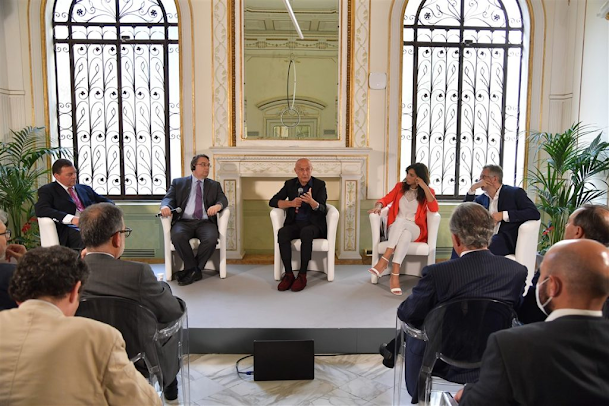The ongoing food crisis, which was sparked by the Kremlin, adds to the epidemic and the slow economic recovery, as well as the climate crisis, the energy transition, and the pressured global supply chains. Not to mention the consequences of the major power struggle between Egypt, Turkey, and Iran, all of whom have competing regional objectives.
"This is unquestionably an era of significant
change and transformations," said William Wechsler, director of the Rafik
Hariri Center and Middle East Programs at the Atlantic Council. He was speaking
at "The Middle East in the New Geopolitical Disorder," a seminar
live-streamed from the Med-Or Foundation's headquarters in Rome to analyse the
region's growing relevance amidst global political currents.
Wechsler tried to explore a rising view among MENA
countries and bystanders that the US is disengaging from the region during his
opening remarks. This view, according to Mr. Wechsler, stems from five decades
of constant US foreign policy, with Washington seeking to maintain the status
quo in the area – until it didn't, beginning with the invasion of Iraq.
According to Mr. Wechsler, the Bush administration
openly switched from defending the status quo to changing it in 2003. Other
policy changes came with President Obama. The Arab Spring and the signing of
the Joint Comprehensive Plan of Action strengthened the notion of a policy
shift in the United States. Mr. Wechsler stated that Donald Trump "was the
largest danger to the status quo ever." "Now we have Joe Biden, who I
believe is the United States' last chance to act responsibly in the Middle
East."
Mr. Wechsler stated, "These dynamics created a
hole," which various parties such as China and Russia sensed and rushed to
fill in the last decade." This was also made possible by the Arab
countries' peculiar fragmentation. In the past, he noted, a potential external
force would have to cope with an Arab leader claiming to speak for the entire
"Arab Nation."
He said that because these Arab actors are currently
weak from a geopolitical standpoint, the current era is unique in history and
permits non-regional actors to increase their influence. As a result, Iran,
Turkey, and even some European nations (though ineffectively), as well as
Russia – after the US had driven it out of the region – have projected their
strength. Finally, there is a new actor in the Mediterranean: China, which has
joined the region in its own unique way, avoiding confrontation and attempting
to build commercial ties.
However, according to Mr. Wechler, the perception of
US withdrawal is simply not based on fact. In reality, Washington is far from
disengaged: it maintains the region's greatest naval and aerial forces, has a
vast intelligence infrastructure, engages in diplomatic activities, and
leverages economic relationships. Aside from the Western Hemisphere, MENA
countries account for more than half of the US' existing free trade agreements.
All of these aspects point to a long-term, long-lasting commitment, which has
been eclipsed by domestic politics in the United States and exhaustion with
long-running conflicts.
Despite its move to the Indo-Pacific, Washington
expected the EU to take a more active role in MENA affairs. That was not the
case. According to Professor Riccardo Redaelli, head of the Catholic University
of Milan's Center for Research on the South and Mediterranean System, the
Russian invasion of Ukraine gave an opportunity for the European bloc to
respond to current events with a united and loud voice. However, Brussels has
maintained a mostly indifferent and inattentive attitude toward the wider
Mediterranean, highlighting its limitations as a geopolitical player.
"History's slap," the expert declared.
The EU's failures are ironic because it is now
scrambling to cut Russian energy imports by procuring them instead from MENA
countries. The Mediterranean Sea has become a hotbed of unsolved geopolitical
difficulties, and energy issues are expected to exacerbate the problem.
"Take the eastern Mediterranean," explained Alessia Melcangi, associate
professor at Sapienza University in Rome and nonresident senior fellow for
Middle East Programs at the Atlantic Council. "It has enormous energy
resources, but many believe it will be the eye of the perfect storm, having
sparked many of the tensions that have hampered joint security and energy
efforts."
The Mediterranean has a lot going for it, which
contributes to its growing importance. Apart from energy, it contains only 1%
of the world's water but accounts for 15% of all maritime traffic. As the food
crisis shows, entire countries are dependent on said commerce – and one can
only imagine the breadth of possible societal catastrophes, which could induce
northward migrant surges. All the more reason, said Karim Mezran, head of the
Atlantic Council's North Africa programme, who moderated the discussion, for
the EU to refocus on the region.
Mr. Redaelli added, "We need a new European
project for the Middle East: a partnership in which we provide money to
autocrats in exchange for them pretending to adhere to our ideals does not
work."
"Many of the underlying causes of what is
happening in Ukraine are tied to the larger Mediterranean area," said
Marco Minniti, head of the Med-Or Foundation and former Italian Minister of the
Interior, emphasising how all of this might have direct consequences for
European stability. The Mediterranean food crisis has the potential to morph
into a social catastrophe, generating political tensions, humanitarian issues,
and pressure from opportunistic forces.
Because of the region's importance to the EU, it is
also crucial to the United States. That, combined with China's expanding
influence, should be enough to persuade Washington to step up its efforts in
the region. Mr. Wechsler, too, believes there is "a chance for the United
States to affect the Middle East issue." He also stated that President
Biden's impending visit to Riyadh, which is aimed at mending frayed ties, is a
positive step forward.

Comments
Post a Comment